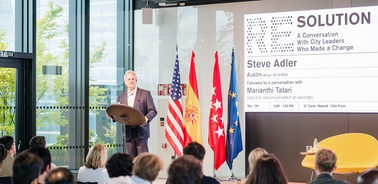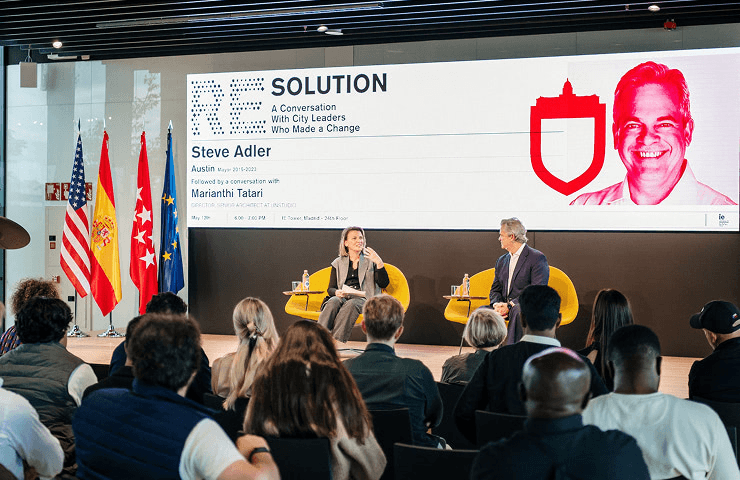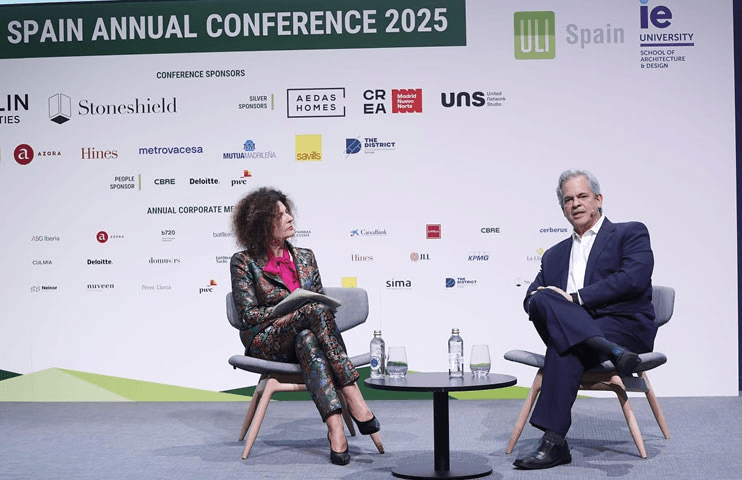Fostering Urban Knowledge: How IE School of Architecture & Design Inspires the Cities of Tomorrow

Associate Dean Cristina Mateo reflects on the School's role in urban innovation through global dialogue, policy insights, and cross-sector collaboration.
In today's rapidly evolving urban landscape, fostering a culture of knowledge sharing is paramount for sustainable and inclusive development. At IE School of Architecture and Design, IE University, we've championed this ethos through initiatives like the Re_Solution public lecture series and our collaboration with Urban Land Institute (ULI) for the Annual Conference of its Spain chapter.
Re_Solution Series: Bridging Academia and Practice
Launched over two years ago, the Re_Solution series has become a cornerstone for dialogues between academia, industry leaders and policymakers. Organized by IE School of Architecture and Design, these sessions delve into pressing urban challenges - from housing affordability to technological integration in city planning. By inviting former mayors from different cities around the world, who have led transformative change, the series offers insights into effective city-making strategies, bringing together diverse voices from varied geographies and local contexts.
The series has featured notable international voices, including former mayors who have led transformative urban initiatives: Enrique Peñalosa (Bogotá), recognized for his work on sustainable urban mobility and public space enhancement; Anna König Jerlmyr (Stockholm), who advocated for climate initiatives and social equity in urban planning; David Miller (Toronto) focused on environmental sustainability and inclusive urban policies; Steve Adler (Austin) implemented innovative affordable housing solutions and zoning reforms.
These dialogues connect academic theory with real-world practice offering architecture and real estate students and professionals concrete examples of successful urban interventions. The series emphasizes the importance of interdisciplinary collaboration, community engagement, and policy innovation in shaping resilient, inclusive cities. It serves as a dynamic platform for advancing knowledge in the complex field of city-making, where innovative solutions emerge through cross-sector dialogue.
ULI Spain Annual Conference: A Confluence of Ideas
Our partnership with Urban Land Institute (ULI) further underscores the School's commitment to knowledge dissemination. The 2025 ULI Spain Annual Conference, held at IE University's Madrid campus, convened over 400 professionals - including developers, urban planners, and public officials - for a full day of open dialogues, keynote presentations, and thought leadership sessions, all aimed at shaping the future of the built environment.
As part of the event, I had the opportunity to talk to former Austin Mayor Steve Adler, whose leadership from 2015 to 2023 offers valuable lessons in navigating rapid urban growth at difficult times, including COVID 19 pandemic. His leadership underscored the importance of proactive planning and community engagement to manage urban expansion effectively. Lessons from Austin's experience informed strategies in other rapidly growing cities.
Key issues that I explored in the conversation with Mayor Adler were:
1. Innovative Financing for Affordable Housing
Under his leadership, Austin implemented two major housing bonds - $250 million in 2018, and $350 million in 2022 - aimed at expanding the supply of affordable housing across diverse user profiles. These funds focused on long-term affordability (75-99 years, as opposed to the typical 5 years), and were allocated toward home repairs, preservation of existing affordable housing, and the creation of low-income rental housing. Such initiatives highlighted the importance of creative financing mechanisms in urban development, and sparked public interest in exploring similar strategies elsewhere. Notably, the "Pioneering Affordable Housing Preservation in Austin" project, won the ULI Global Award for Excellence.
2. Addressing Homelessness Through Comprehensive Strategies
Recognizing homelessness as a critical issue, Adler's policies focused on decriminalization of camping and providing supportive housing solutions. While the scale of homelessness in Spain is not as severe, his example demonstrated how increasing visibility around the issue helped the community´s involvement to address the problem.
3. Equity-Focused Urban Planning
Under Adler's leadership, Austin prioritized equity in urban planning by addressing historical injustices and promoting inclusive development. Initiatives included the establishment of an Equity Office and the implementation of tools to assess the impact of policies on marginalized communities.
Insights from Mayor Adler's administration offer valuable lessons for future professionals in real estate and architecture, emphasizing the importance of innovative financing, regulatory reform, comprehensive social strategies, equity, and proactive leadership in urban development. His vision for the future highlights the need for collaboration between the private and public sectors. These takeaways underscore the potential of collaborative efforts in addressing urban challenges, and the value of sharing best practices across borders.
Through initiatives like the Re_Solution series and collaborations with organizations such as ULI, IE School of Architecture and Design strives to foster a culture in which continuous learning and knowledge exchange are integral to urban development. By bridging the gap between theory and practice, we aim to equip professionals with the tools and insights needed to navigate the complexities of contemporary urbanization.
As cities continue to grow and evolve, the sustained implementation of such initiatives will be crucial to ensuring that urban development is both sustainable and inclusive, responding to the diverse needs of their inhabitants.
_______
Cristina Mateo is the Associate Dean of the IE School of Architecture and Design, where she leads strategic initiatives, business development, and stakeholder engagement across the school's programs. With a Ph.D. in Sociology from Goldsmiths, University of London, and an Executive MBA from IE Business School, she specializes in urban ethnography, branding, communication, and digital transformation. Her professional background includes roles at Madrid City Council and VisitBritain, focusing on city branding and e-commerce strategies, and Razorfish, Marchfirst and AtKearney, where she led pioneering projects in Human-Computer Interaction (HCI) and User Experience Design (UXD). At IE University, she teaches courses on "Sociology and Culture" and "Digital Transformation," and contributes to research on the intersection of technology and urban life.

